How a British bulldozer is being seen as a symbol of religious discrimination in India
The initials ‘JCB’ have become synonymous with the machines used by India’s Hindu nationalist ruling party to enforce law and order in Muslim areas, as Sravasti Dasgupta reports

At around 8.30am on 20 April, Rahima Begum, a street vendor in New Delhi, heard that the municipal authorities would be conducting an “anti-encroachment” demolition of makeshift homes and businesses in Jahangirpuri, where she lived and ran a roadside soft-drink shop with her family.
Residents in the crowded area in the northern part of the Indian capital were tense after the order was issued by the North Delhi Municipal Corporation (NDMC), run by prime minister Narendra Modi’s Hindu nationalist Bharatiya Janata Party (BJP). The two-day drive would take place in a primarily Muslim neighbourhood.
Three days earlier, the area had been the site of community violence during a procession to mark the anniversary of the birth of the Hindu god Hanuman.
Desperate, Rahima sought reassurance from the police.
“I asked them repeatedly if our shops will be demolished,” she tells The Independent. “But they reassured me again and again that bulldozers would only come to clear the garbage in the area.”
But just hours later, shards of broken glass, an overturned fridge with its contents spilling out, and a mound of rubble was all that remained of Rahima’s shop. It was one of scores demolished by government workers using JCB bulldozers, which had rolled threateningly into the neighbourhood, flanked by police and military personnel.
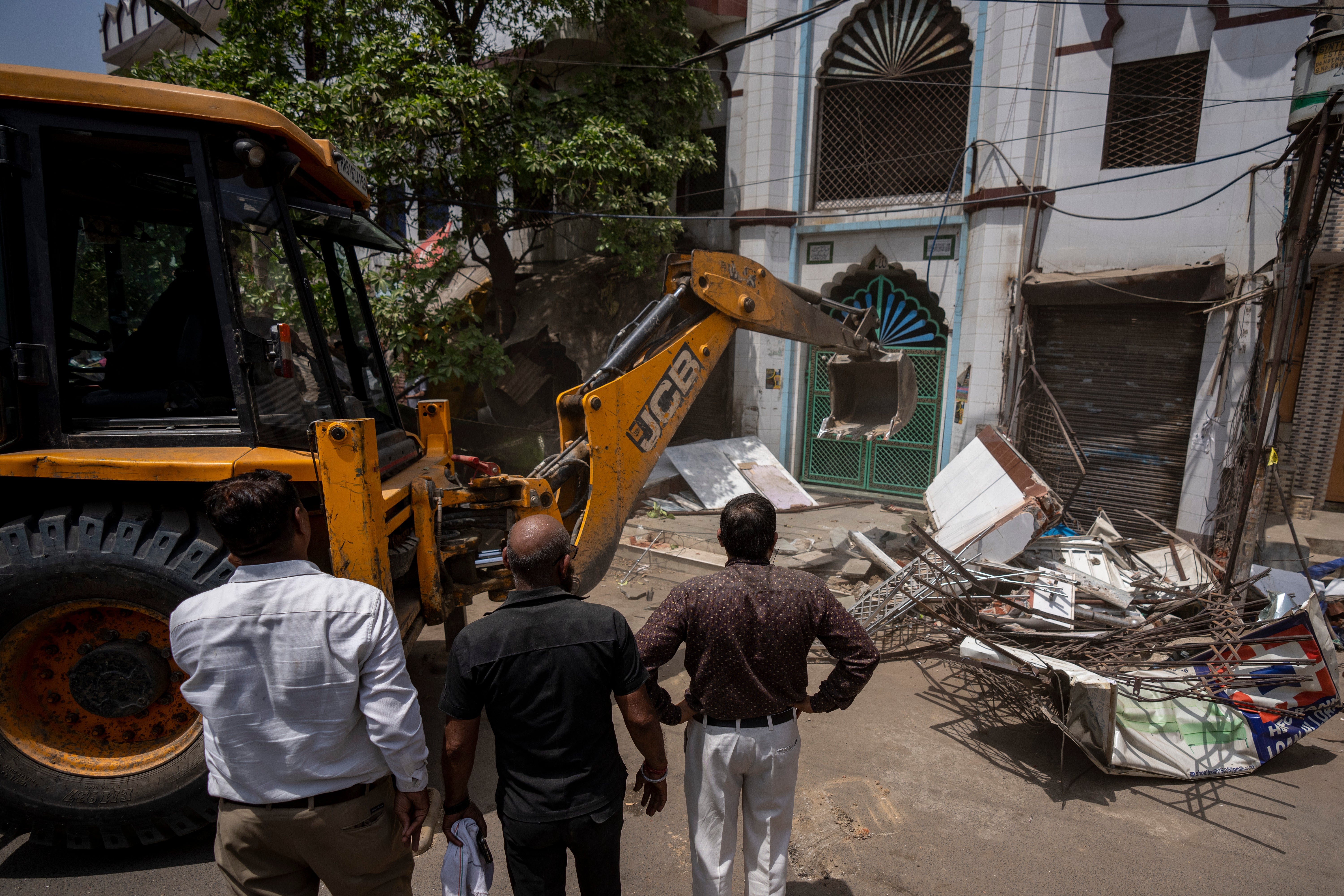
In Britain, the JCB bulldozer is one of the most recognisable machines in the construction industry, known throughout the country by its initials. The company’s owner, Lord Bamford, is a major Tory donor. During a visit to India in April – at the height of the controversy over the Delhi demolitions – Britain’s disaster-prone prime minister Boris Johnson visited a new JCB factory and posed among the machines.
Unsurprisingly, Mr Johnson faced an immediate backlash. Across India, the humble JCB is increasingly viewed as the machine of choice for meting out collective punishment by BJP-run state governments.
JCB in India is a commercial success story, with five factories (not including the new one in Vadodara that Mr Johnson visited) that export to more than 110 countries. The company’s website states: “Over the years, JCB has invested Rs20bn (£20.7m) in India, and today employs 5,000 people in its Indian operations,” adding: “The company started as a joint venture in 1979, and is now a fully owned subsidiary of JC Bamford Excavators, United Kingdom.”
While JCB cannot control the onward sale or use of its products once they have been sold to dealers, the brand is achieving recognition in India for matters unrelated to the manufacturing industry.
Bulldozers first came to public attention when the chief minister of Uttar Pradesh, Yogi Adityanath – who has earned the nickname “Bulldozer Baba” – deployed the machines to enforce law and order, using them to destroy property belonging to criminals and gangsters in the state.
They have since become a symbol of Adityanath’s political might, and have even taken pride of place in his election speeches.
The model of “justice by bulldozer” has spread to other BJP-ruled states, including Madhya Pradesh and Assam, as well as the MCD in Delhi, being hailed by party supporters as a sign of the authorities taking tough action on crime.
Prior to the demolitions in Jahangirpuri, bulldozers demolished scores of homes and business establishments in the city of Khargone, Madhya Pradesh, which had seen a bout of severe religious violence following Ram Navami processions.
In Delhi, the bulldozers brazenly continued with the demolitions in Jahangirpuri despite the intervention of the Supreme Court. The MCD has since continued to use bulldozers in different parts of the city, mostly in Muslim neighbourhoods, despite protests from residents.
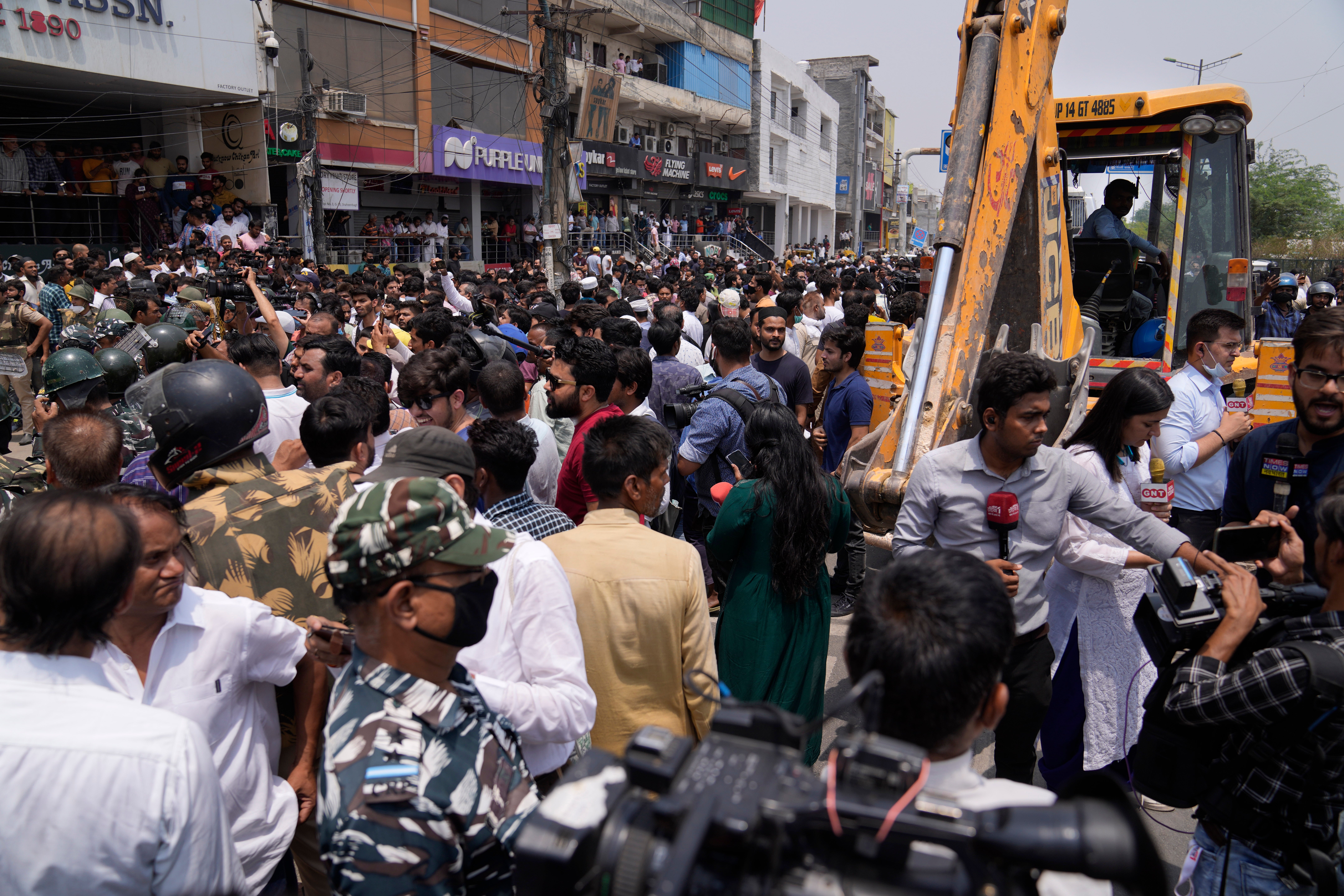
In Assam, a border state in the country’s northeast ruled by the BJP, the authorities demolished houses belonging to residents alleged to have been involved in burning down a police station after a villager died in custody.
The threat of bulldozers, and by association the initials “JCB”, has also popped up in statements made by BJP leaders in recent months, who have used the terms synonymously.
After the Jahangirpuri demolition, BJP lawmaker GVL Narasimha Rao wrote on Twitter on 20 April: “JCB = Jihad Control Board #BulldozerBaba”. BJP national secretary Sunil Deodhar also tweeted on the same day: “JCB = Jihad Crush Board!”, using the hashtag “#bulldozer”.
The tweets included images of a JCB machine, and both were later deleted following a backlash.
The BJP has also threatened the use of “JCB bulldozers” in the southern state of Karnataka.
“There was a time when terrorists were fed biryani. Now there’s no biryani; if anyone wags their tail, JCB bulldozers will reach them,” BJP national general secretary CT Ravi was quoted as saying by India Today on 24 April.
In February, Telangana BJP leader T Raja Singh was issued a notice by the Election Commission after he threatened to use JCB machines against those who don’t vote for Adityanath in the Uttar Pradesh state elections.
“Those who do not vote for the BJP, I would like to tell them that Yogiji has arranged thousands of JCB bulldozers...” Mr Singh had said.
And just this weekend, JCB bulldozers returned to Uttar Pradesh. On Sunday, the machines rolled into Prayagraj and demolished the house of Javed Mohammad, one of the accused in the violence that erupted last Friday during protests over comments by former BJP spokespeople about the prophet Muhammad.
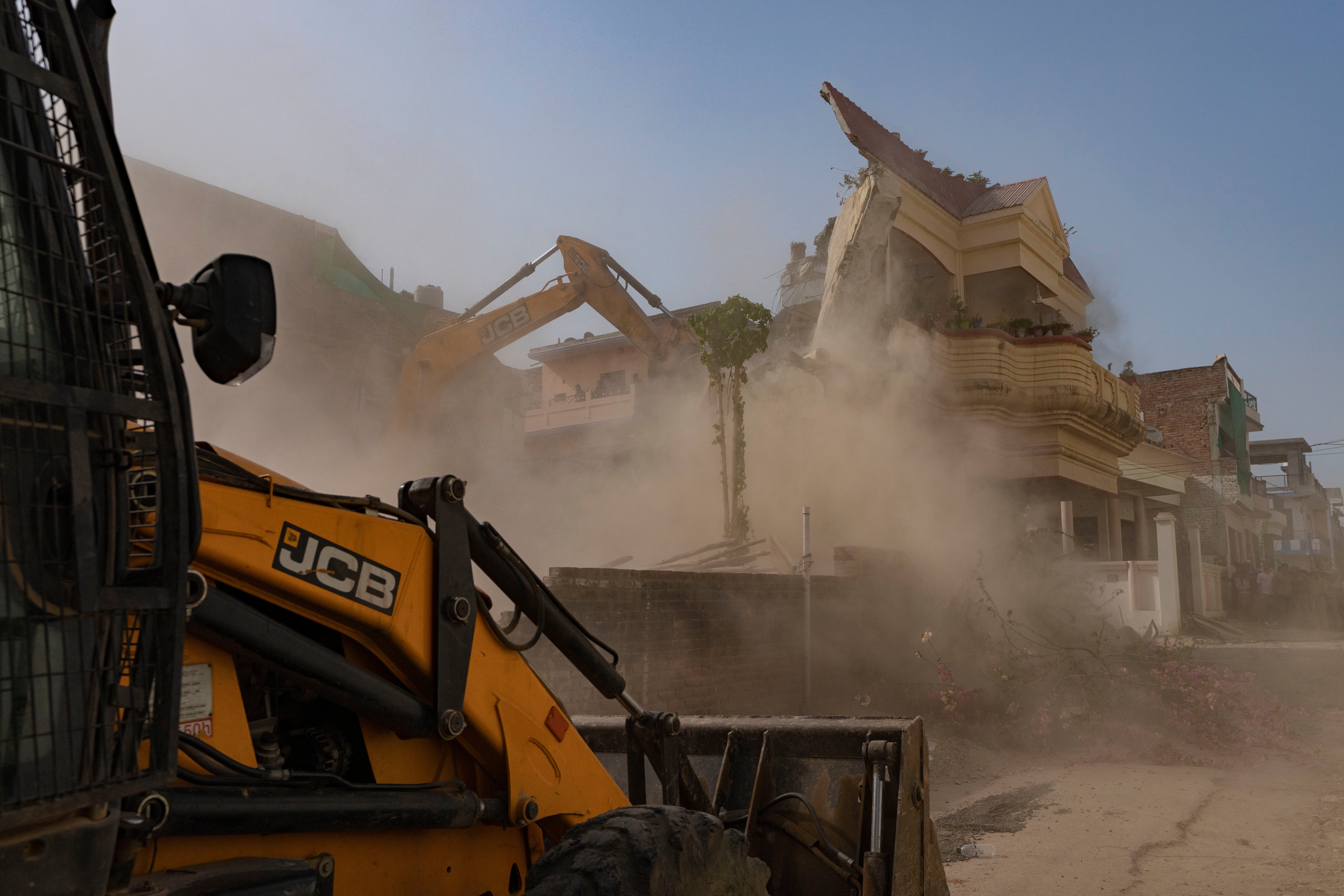
While JCB machines have been seen in photographs and videos of these demolitions, it is impossible to know whether it is exclusively this brand that has been used in the demolition drives.
There is no evidence to suggest that JCB is aware of the use of its bulldozers for these demolitions. JCB did not respond to requests for comment from The Independent prior to the publication of this story.
Victims of demolitions in Delhi and Khargone say that their properties were destroyed “illegally”, without any prior notice. Critics claim that the use of bulldozers to enact collective punishment by the state signifies a breakdown of the justice system.
More than a month after her shop was demolished in Jahangirpuri, Rahima says she and her family are struggling to pick up the pieces. “We have set up a small makeshift shop inside our house,” says Akbar, Rahima’s 38-year-old husband.
The couple have three children. Videos of their 11-year-old son tearfully picking up stray soft-drink bottles that had been spared by the bulldozers went viral on social media after the demolition.
“We received some donations from a lot of people after his videos went viral. A lot of people have come to help us, which is why we have managed somehow till now,” says Akbar. Rahima adds: “I urged them to at least let the fridge be, so we can rebuild our shop, but they left nothing.
“[The police] latched us inside our houses from outside. Our reri [shop] was in front, and the house just a few feet behind. I kept pleading with them that I have all documents, permissions to run this shop, but they did not listen to a word and just started breaking everything down.”
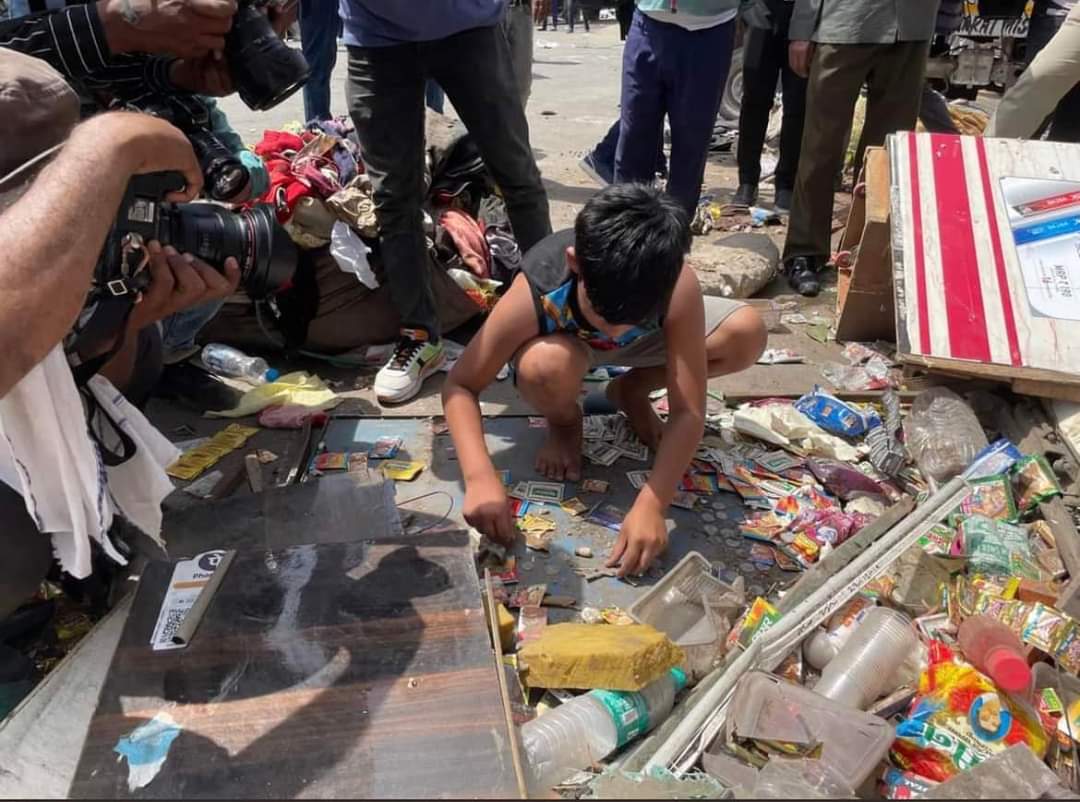
The bulldozers were called in after Delhi’s BJP president, Adesh Gupta, wrote to officials asking them to identify and demolish “illegal encroachments and constructions” associated with the people accused of taking part in the Ram Navami violence. Residents claim the move was political, and that it only targeted the poor and minorities.
“The action was taken just a day after Adesh Gupta’s letter. If they had to act against illegal encroachers, why didn’t they see our papers? This was a political move by the BJP,” says Ganesh Gupta, whose juice shop stood a small distance away from Rahima’s and was also demolished.
“My father set up this shop in the 1970s. After his death, I took over the reins. MCD has conducted inspections in the past, issued notices. But we showed our documents and they have been satisfied,” he says.
“This time, I kept pleading and shouting that at least look at my papers once, but no one heard a word and they simply demolished my shop.”
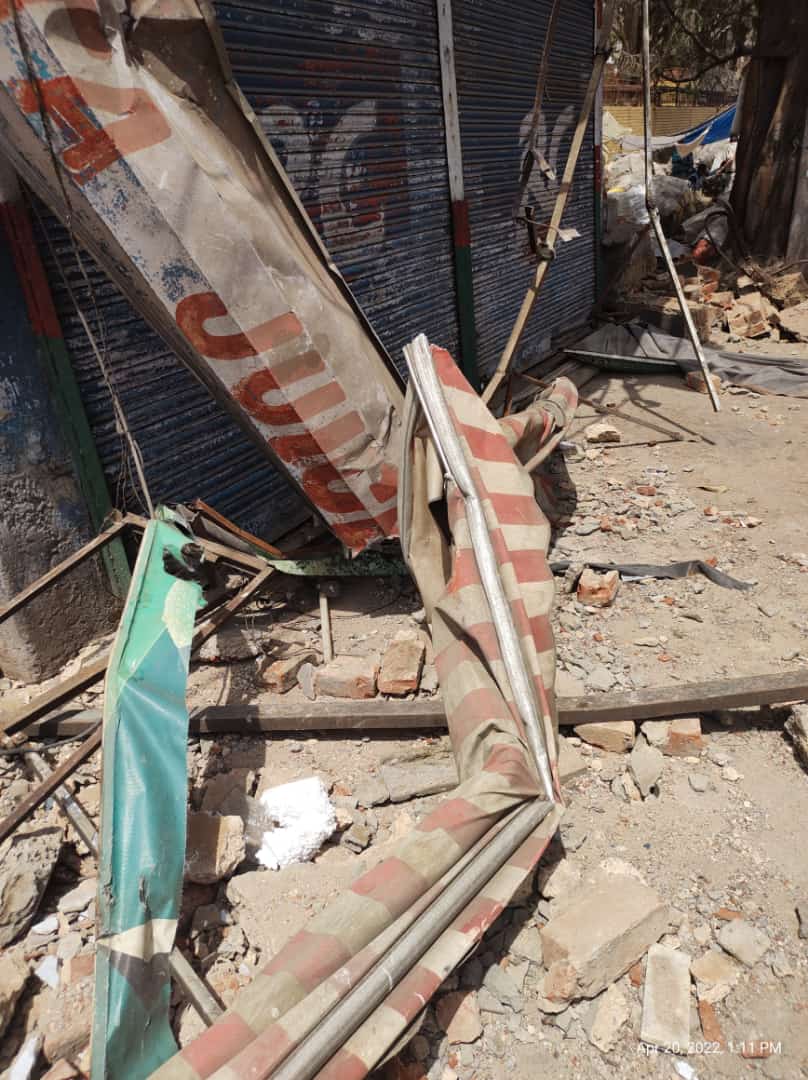
In Khargone, in Madhya Pradesh, at least 10 houses were set ablaze and more than two dozen people, including a senior police official, were injured on 10 April in religious riots.
The next day, home minister Narottam Mishra of the BJP-run state government announced at a press conference that the houses of those involved in stone-pelting during the procession “will be turned into piles of stones”.
The restaurant of Muslim resident Asad*, 36, was one of the properties demolished.
“A curfew had been imposed since the Ram Navami violence and my restaurant was shut. Around 6.30pm on 12 April, municipal authorities came and demolished my restaurant. Only a few workers were around, and they did not have phones to inform me. I only found out after the demolition, from acquaintances in the area,” he tells The Independent.
When the curfew was lifted on 18 April, Asad travelled to Indore to seek legal recourse, and filed a High Court case demanding compensation for what he claims was the illegal demolition of his property.
“In court, the authorities have said that my restaurant was built on a residential permit and not a commercial one. But that is not true. I have a commercial permit,” he says.
“If they gave me notice or informed me then I would have said something, but I was given no opportunity to present my documents.”
Nasir*, another Khargone resident, says his bakery was demolished without notice as he shares his name with someone who had been accused of taking part in the violence.
“If they had sent a notice, they would know that I am not that person, and I would have shown my documents. I have all permits, yet the means of my livelihood has been demolished,” he says.
“I am waiting for a hearing date in the High Court. I want compensation for my loss of livelihood, and I want the authorities to admit that they have wronged me. If I am guilty, then let them prove it. I have all papers to show that my establishment was legal.”
The use of bulldozers has also drawn condemnation from the opposition parties. The Aam Aadmi Party (AAP), which holds power in Delhi’s legislative assembly, has demanded the intervention of federal home minister Amit Shah.
“They are ... razing any shop and house. Even if people show them papers to prove that the structure is not illegal, they do not check them,” said Delhi’s chief minister Arvind Kejriwal.
Calling it the “demolition of India’s constitutional values”, Congress MP Rahul Gandhi said on 20 April: “This is state-sponsored targeting of poor and minorities. BJP must bulldoze the hatred in their hearts instead.”
Lawyers associated with pleas filed by victims in Delhi and Madhya Pradesh say the use of bulldozers took place outside the rule of law. Anas Tanwir, who is providing legal aid to victims in Jahangirpuri, says the process of natural justice is being violated.
“Natural justice is the basis of every law, and the most crucial component of natural justice is “Audi alteram partem”, which means “Hear the other side.” No legal action under any law can be taken without hearing the other side,” he says.
“Second, the state cannot take any action without following the law. In Jahangirpuri and Khargone, the state did not follow law, and the whole action is illegal and vindictive.”
Ashhar Warsi, a lawyer representing the victims in Khargone, says the clearances are “extrajudicial acts”. And Faizan Mustafa, vice-chancellor at the Nalsar University of Law in Hyderabad, says public statements made by party officials about the demolitions “demonstrate that the purpose is not upholding of [the] rule of law, but rather trying to instil fear in people”.
The Independent has reached out to Sanjay Mayukh, national media coordinator for the BJP, for comment.
(*names changed to protect identities)
Update (30/06/22): Following publication of this article representatives of JCB made the following statement: “JCB supplies its products primarily via third party dealers in India. Once JCB products are in the hands of the third party dealer or on the second hand market, JCB no longer has any control over the products and cannot dictate who they may subsequently be sold to or used by. As an organisation JCB does not condone any form of human rights abuse and we have a consistent record of providing urgent and substantial support in response to natural disasters around the world.”






Join our commenting forum
Join thought-provoking conversations, follow other Independent readers and see their replies
Comments